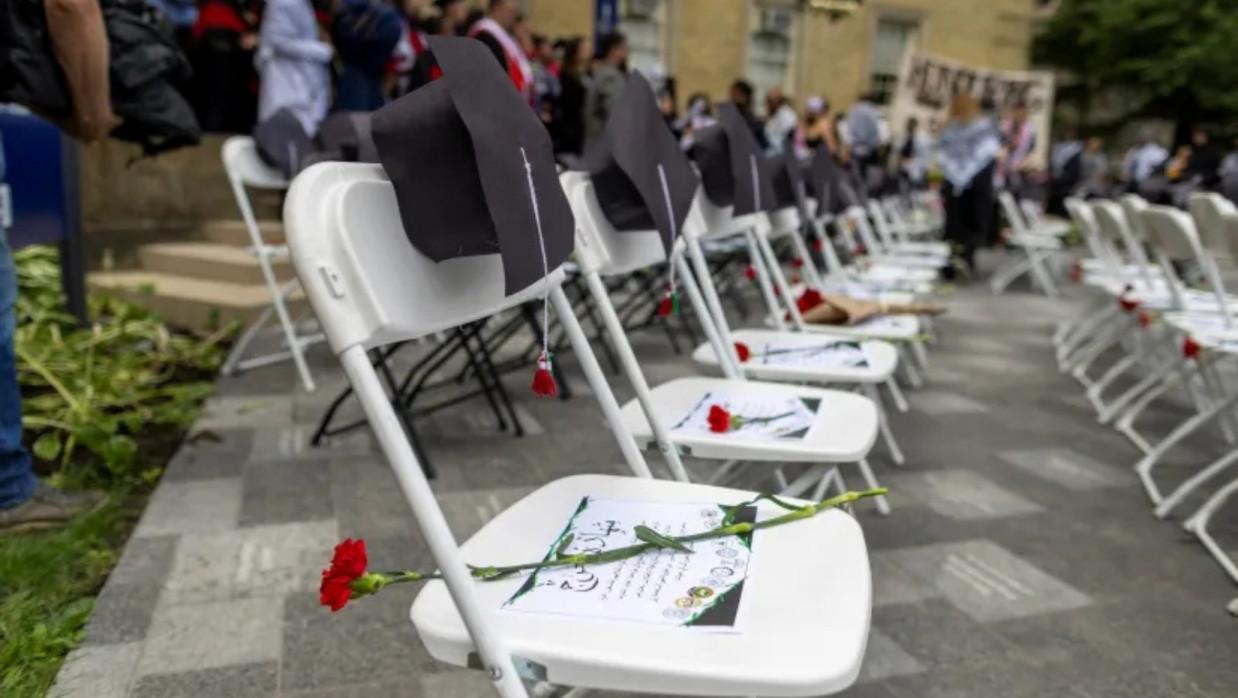
White Chairs and Arabic Certificates: Universities’ Role in Genocide Complicity
- ১৪ জুলাই ২০২৫, ১২:৪০

On 3 June 2024, anti-genocide activists at the University of Toronto held a symbolic convocation ceremony, placing Arabic-language certificates, flowers, and graduation caps on white chairs to honor Palestinian students killed by Israeli forces in Gaza. This poignant act highlighted a grim reality: universities worldwide, including those in Canada, are implicated in an economy fueling what a UN Special Rapporteur has termed a genocidal regime.
In her report, From Economy of Occupation to Economy of Genocide, UN Special Rapporteur Francesca Albanese details how universities profit from investments tied to Israel’s military-industrial complex. The report, which prompted the US government to impose sanctions on Albanese, actions she called “despicable” and “mafia-like intimidation,” exposes how academic institutions, under the guise of research neutrality, are complicit in a colonial economic framework that supports ongoing atrocities.
Universities and the War Machine
Albanese’s report reveals that universities invest endowment funds in companies like Elbit Systems, Israel Aerospace Industries, IBM, and Lockheed Martin, which directly support Israel’s military operations. These investments, coupled with military research collaborations, implicate universities in genocide, making administrators and researchers accountable under international law. Fields like law, archaeology, and Middle Eastern studies often sanitize the Nakba’s history, lending legitimacy to a “genocidal apparatus,” while STEM disciplines engage in research and development for military contractors.
At MIT, Israel’s Defense Ministry funds drone squadron research. In the UK, the University of Edinburgh invests over half its endowment in firms linked to Israeli military activities. Canadian universities, though not named in Albanese’s report, are equally culpable, according to analysts. The University of Toronto has deepened ties with Israeli institutions over the past decade, spanning humanities to cybersecurity. Donors with connections to Israeli-affiliated firms influence hiring, drawing criticism from the Canadian Association of University Teachers.
Reduced public funding has made universities reliant on such donors, amplifying external influence. Post-genocide outcry, Toronto expanded AI projects, student exchanges, and research funds with Israeli universities, including the “Archaeology of Israel Trust,” which supports excavations legitimizing Palestinian displacement.
Investments Fueling Complicity
The University of Toronto’s Asset Management Corporation (UTAM) invests in companies like Airbnb, Alphabet, Caterpillar, Elbit Systems, and Lockheed Martin, identified by Albanese as complicit in genocide. A 2024 report notes that 55 of these firms operate in the military and defense sectors. Of UTAM’s 44 investment managers, 12 have allocated approximately CAD 3.95 billion to 11 companies listed by the UN Human Rights Office (OHCHR) for supporting illegal settlements.
Western University has invested CAD 16 million in military contractors and over CAD 50 million in firms tied to Palestinian occupation and genocide. McGill University also funds companies like Lockheed Martin, Airbus, BAE Systems, Safran, and Thales.
Calls for Accountability
Students, faculty, and staff across these universities demand divestment from Israel-linked entities, arguing that such ties violate international law. Albanese emphasizes that institutions must uphold human rights, regardless of state policies, and that domestic law compliance does not exempt them from international obligations. University administrators who suppress protesting students while maintaining these ties risk liability for aiding genocide under international law.
Albanese concludes, “Corporate actors, their executives, and complicit entities must face accountability. This is essential to halt genocide and dismantle the capitalist, racist structures enabling it. Ensuring this accountability extends to universities is our collective responsibility.”
The symbolic white chairs at Toronto’s ceremony serve as a stark reminder of the human cost of academic complicity, urging institutions to sever ties with systems perpetuating violence.